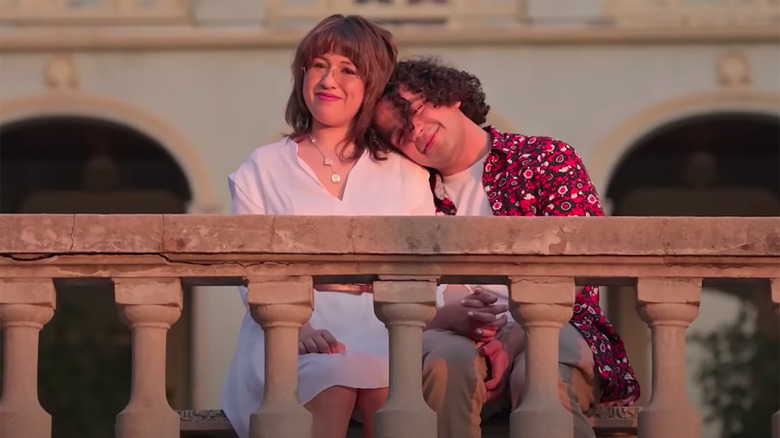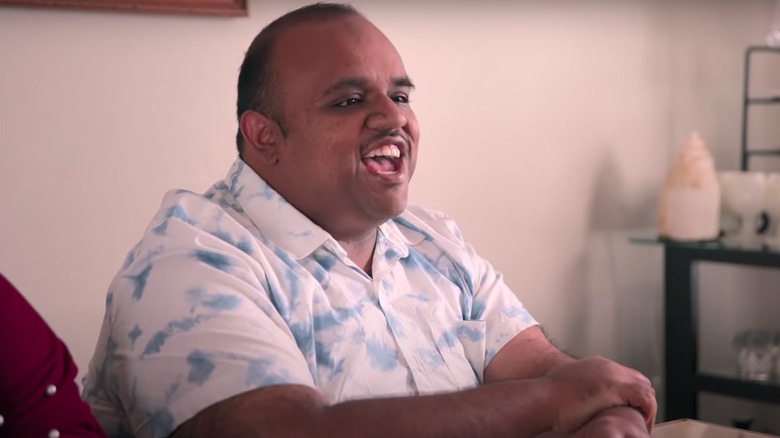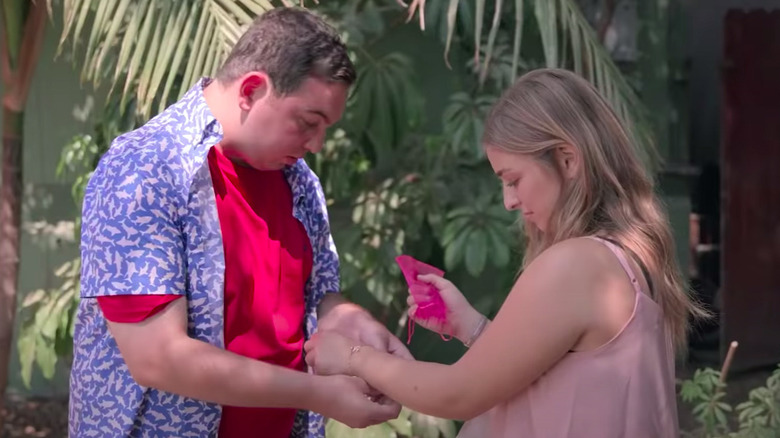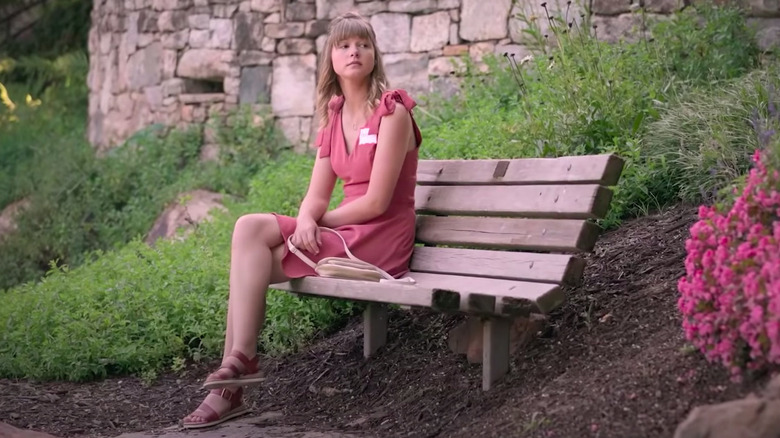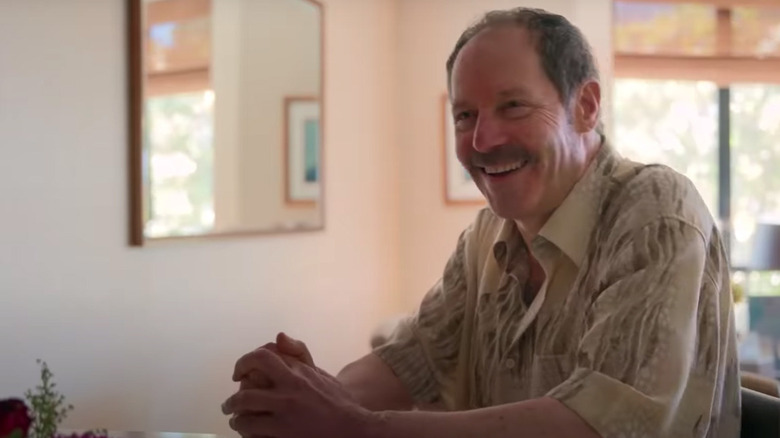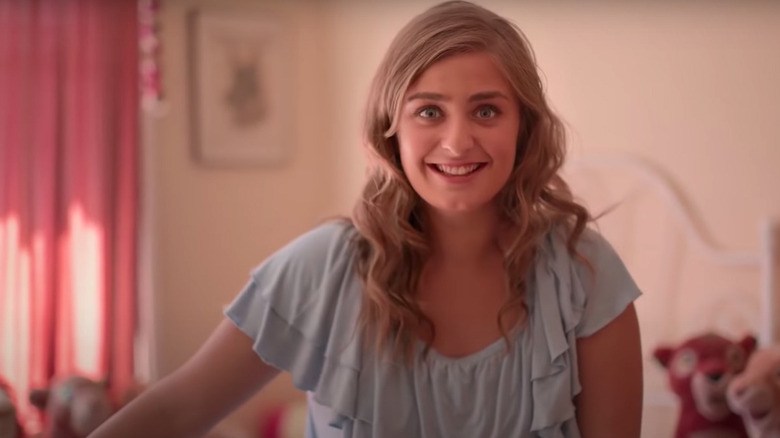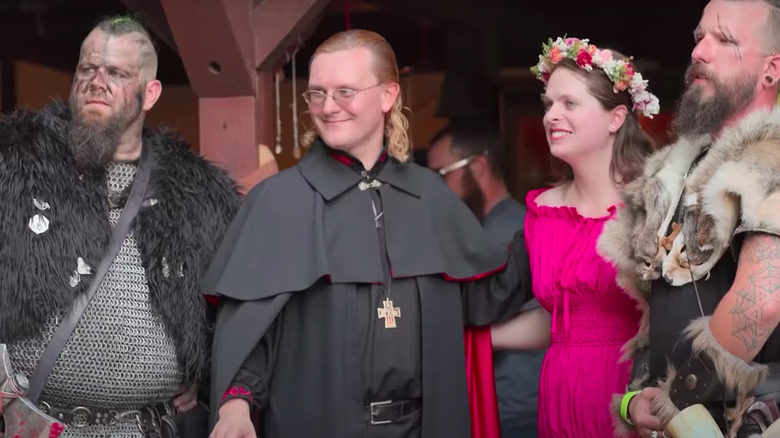Love On The Spectrum Creator On Landing Between A Doc And Reality TV, Autism Misconceptions & More [Interview]
Among all the trashy reality dating shows available to stream on Netflix lies a charming, delightful spark of joy called "Love on the Spectrum." Originating in Australia, the documentary series follows a group of men and women on the autism spectrum as they embark on a journey to find love. The first two seasons of the original Australian series are full of uplifting stories that shine a light on the broad range of people with autism, tearing down the many misconceptions that still exist in a world that doesn't fully understand them.
Today, "Love on the Spectrum" is back with a whole new line-up of subjects looking for romance in a spin-off series taking place in the United States. In conjunction with the arrival of the new episodes on Netflix, we spoke with series creator, director, and executive producer, Cian O'Clery, about bringing the show to the U.S., how the show finds its stars, and balancing his interaction with the subjects on-screen while also maintaining a certain distance behind the documentary lens. O'Clery also reflected on his days working as part of the crew on "The Matrix" sequels and "Star Wars: Revenge of the Sith," and how they pushed him to follow his creative ambitions.
'We've heard of lots of programs that have started because of the show'
I love the original Australian version of "Love on the Spectrum," so it was very exciting to hear that you were doing a version in the U.S. as well. I've read that, in Australia, you found there wasn't much support in the way of matchmaking for people on the spectrum. Did you find that was better in the United States at all?
Not really, no. In terms of dating and relationships, no. I think, in Australia, there's a lot of support for employment and there's a lot of support in that world, there's a lot. That said, we have an NDIS Scheme in Australia, so there's plenty of support for people when it comes to jobs, and what they call life skills and things like that, but not when it comes to dating and relationships. And no, it didn't seem like there's a lot here, either. Having said that, we've heard of lots of programs that have started because of the show and lots of organizations that are starting to get involved in that after the series. So that's really great, that it's having a positive impact, I guess.
What's your process of finding subjects for the show? How much time do you spend with them before determining if you're able to follow them and whether or not they actually want to do something like this?
Well, firstly, people write in to us. We put the word out. We do everything you wouldn't do for a normal dating show. We don't go through casting agencies. We don't have casting people who work in that world. We basically work as a whole producing team. We have a small editorial team, and we just all do the casting. I had someone in Australia, actually, we started casting really early. We had one person just working on it slowly over time, reaching out to all of the autism organizations, support groups, psychologists who work with people on the spectrum, just individuals, people who have followings. But basically any possible way you can imagine to get the word out.
That's really the thing, is just to make sure as many people as possible hear about the show, and then they have the opportunity to write in to us and express interest. Then we get lots of people writing in saying, "I'd love to be part of this." And we start out by giving people a call or having a quick Zoom chat. Then you get to a point where you start to have a bit of a short list of people we think might be good and just get to know them more and more, speak to them fairly often as you get down to that later process. I always actually go and visit people before we make a final decision, which meant I did a bit of a tour of America before we started filming. I think it's just really important to meet people in person and to make sure they understand what being involved means, what their feelings are, how they feel about it, and why they want to get involved. So yeah, it's a very thorough process.
'For me, the most important thing is that we, as a crew, are really small and quiet...'
Once you have all your subjects determined, how much time do you typically spend with them for the series? How much are you shooting with them?
It really depends on the people and where their story goes. That's one of the things about the series is, we see it as a documentary series. I know people call it a reality series. I think it sort of sits in the middle a little bit. The constructed element obviously is that we find matches for people and we help organize dates, but we kind of have to do that because there isn't that support, there aren't people out there doing this thing, so we sort of have to be matchmakers.
One thing is we're really flexible as a production. We're a really small team and we have a shooting period that we don't shoot full time. We don't shoot five or six days a week. So we just need to have flexibility firstly, to work on the terms of the people we're filming, to make sure that it's all about them and when they're available, and it's not about us saying, "Hey, you need to film." Then it's always working together on that. But the other thing is, I guess minimum, probably four days, maybe half a day each time, or five days. It's not a lot and it's always around their schedules, but then if people's stories really keep going, then it's more. For example, Dani is probably featured in this series more than anyone else just because her story kept going and things kept happening.
That's something that's really important to us, being really flexible and not being rigid at all in terms of, "This is what we're doing and this is how long for and this is what the story is." And that, I think, also feeds into the documentary style element of what we do. We're not being hard and fast about any rules or how we do things. We're always really open to twists and turns.
You talked about sitting in the middle of reality show and documentary, and I was wondering if there any reality TV tropes that you actively tried to avoid in order to make this feel a little bit more pure and more like a documentary?
Firstly, the way that we shoot is very much vérité documentary style, and I hope that doesn't sound pretentious. But whenever we're filming, for example, in someone's home, for me, the most important thing is that we, as a crew, are really small and quiet, and people almost forget we're there because that's how you get the real stuff. That's how you get people being really truthful. Sometimes people say to me, "Oh, I forgot you were there," and to me, that's the best thing someone can say. We're not the crew that comes in and sets up lights and has producers everywhere and tells people what to do and, "Okay, now you're going to walk over there and you're going to say this." A lot of unscripted shows in the U.S. are made like that. It was interesting actually working with the crew and trying to instill this thing of, "Guys, when we're in someone's place we just roll. We're just going with what's happening. We're not planning things." Sometimes it takes people a while to get used to that way.
Although I say "crew," I mean, literally it's me, camera, sound, and an [associate producer], that's it. Oh, and a Covid officer, since we filmed during the pandemic. But it was important for me to shoot this U.S. series the same way we shot the Australian series, not to big things up and change the methodology, because I think it's part of what makes it work, that it just feels real.
'It is really important that we capture something that is as authentic as you possibly can'
Along those lines, in this edition of the series, you feature speed dating events that aren't specifically tailored to those with autism. How do you shoot those sequences without letting those who aren't the subjects of the documentary know details that those on the spectrum might not be ready to reveal? For example, you have one woman here who doesn't go out of her way to say that she has autism during a speed dating event...
Yeah, that's an interesting question and that's something we ... look, we did tell people what the show was called, everyone who was involved in those speed dating events. So you can't really bring people into something like that when you're filming and hide something. But it is a really interesting question because in the real world, for example — I guess you're talking about Kaelynn or Dani — if they were to go to speed dating, everyone at speed dating isn't going to be told, "Hey, this is about autism." So it's an interesting question, I'm glad you asked that. But you also can't hold that back from people. So people kind of knew, but I think some people didn't necessarily know what that meant, in a bigger sense. But it's hard, because it is really important that we capture something that is as authentic as you possibly can.
How do you balance that with engaging with the subjects, especially when they're out on the date, as opposed to when you just let them feel things out? Like, for example, Dani asked you if she did something wrong in her first date with Solomon after she gushes about loving him and thinking that he's hot. And you're quick to say, "No, I don't think so." But I feel like I would've maybe offered some friendly advice like, "Well, maybe that's too much for a first date."
Yeah, I think there's the balance of how much I'm just observing and in the background as [opposed] to being involved. And I think I try and be in the back, I try and be as far away as possible during the dates. But in a moment like that, when he's stepped away and then Dani does look to me, she knows I'm there. I'm operating the second camera. So I was shooting that as well as talking to her.
Look, I don't know, I don't think she did anything wrong, but I think it's one of those things where, if I was to start suggesting bigger picture ideas about whether telling somebody you love them on a first date is appropriate, that's probably just a bit too complex and a bit too much for the moment. You know what I mean? But I think that's something that she and her aunt have talked about, as to whether she got a little bit carried away. But she was passionate in the moment, and I think you can see that she clearly got very swept up in the emotion of the day.
Oh, for sure.
'You can't make any assumptions about someone because they're on the spectrum'
What's one of the most important things you've learned about autism yourself while making the show?
The most important thing — I had learned this before making "Love On The Spectrum," but it only just gets confirmed the more I work with people on the spectrum for a show like this. It's that every single person is so different, and you can't make any assumptions about someone because they're on the spectrum. I think that's what the most important thing for me in making a show like this. That's the most important takeaway I hope that an audience takes with them when they watch a show, is that you've got such a variety of different people, Kaelynn and Subodh and Abbey and Steve, [and] everyone's so different. I think that's the most important thing, just the diversity of autism and just how different people can be. Just never make assumptions about someone because they're on the spectrum. I think one of the reasons we made it in the first place was not only that, but also shining a light on the fact that there have been traditionally, in the past, some misconceptions about people on the spectrum.
Right.
I think one of the big misconceptions has been, "Do people on the spectrum want to find love? Do they have empathy?" I think that's a terrible misconception and one that's really important to address. That was really important in starting this series and in getting it happening, and I think it's great to have the opportunity to make a U.S. version and hopefully bring in more audiences who can learn a bit and have fun at the same time. I guess that's the trick with a show like this: We're not just providing entertainment, hopefully. Hopefully people are actually taking something away from it.
Yeah, absolutely.
But at the same time, you need people to enjoy watching it as well, so it's finding that balance.
You always manage to get such perfect shots of any animals that are in the vicinity, especially dogs. Is that something that you ask the crew to capture or does that just come about organically?
Well, I mean, I'm always shooting them. I've got a thing for pets. It's funny, it's been in all of my series. I did another series before "Love On The Spectrum" in Australia, and there's so many pet shots. It brings life, I think. It helps fill, I don't know, the life of a home or the life of a family. Also, I was really excited to be in the U.S. because I could shoot squirrels.
[Laughs] Oh, yeah!
It was great. So that was all me just getting excited about squirrels, because we don't have them back in Australia.
'I'm just so happy to be able to share these people's stories and give voices to them'
Can we expect a third season of the Australian "Love On The Spectrum" to come about? Is that something being worked on?
Not at the moment, no. That's on pause for now. So who knows? Never say never, but not at the moment. And who knows what'll happen with the U.S. series? I guess it'll all depend on whether people watch it and enjoy it.
I hope that there is a second season. I would love to catch up with a lot of these people again.
Can I ask you who are your favorites are?
I love Abbey, just because she's so enthusiastic about everything. She's so, so sweet. And I love Dani's story, too. She's fascinating to watch because she's so accomplished and she's her own woman, but then she also is held back in her pursuit for love because she's so focused on her love of animation and she's always trying to fit somebody else's life into that passion. It's interesting to see her figure all that out.
Yeah, it's interesting, isn't it? That's one of the common traits that you do find in people on the spectrum. Not all the time of course, but it's their really strong passion for something. And obviously Dani, animation is just her life. I feel a real commonality ... not commonality. What's the word? My passion for film and TV and my work, it feels quite similar to Dani's obsession with animation. I'm a bit the same. I need to actually branch out a bit and have a bit more of a life outside of what I do. But it's working for her, and she loves it, and it's great that she's passionate about something.
I also love that you were able to find somebody much older who is on the spectrum, too, because almost all your subjects were young, but having this, it provides an entirely new perspective.
Yeah, that was really great. We were so happy to meet Steve and just fell in love with him straight away. He's just such a sweet guy. It was really interesting, and that just speaks to the fact that we've learned so much about autism in recent years. Somebody his age, he grew up most of his life where nobody knew anything about autism. Even James, who's 34, I think, talks about how when he was young, people didn't really understand autism, so imagine what it was like for Steve. I mean, Steve grew up most of his life where, not only did he not understand what was going on, and he didn't know about autism, but society had really no clue. So we've come a long way in the last 10 years. There's a lot more understanding, which is good. I think that's why I'm just so happy to be able to share these people's stories and give voices to them.
As we wait to find out if there is maybe a third season of "Love on the Spectrum" or a second season for the U.S. version, what else do you have in the works that's coming up?
I'm just working on a couple of ideas in my mind. I'm cooking up a few different things. I'm not really a hundred percent sure at the moment, but I think, for me, I always want there to be another reason for making something rather than just entertaining people and trying to get an audience. I always want there to be a bigger purpose to something, without sounding pretentious. You know what I mean? So I don't know, I'm exploring a few different ideas and we'll see.
You're familiar with the "Seven Up!" documentary series, right?
Yeah.
I would love to catch up with some of these subjects after so much time has gone by and just see what has happened in a longer period away from them.
Hmm, yeah, I mean, that's a great idea. Maybe every few years we can pop in and see how everyone's doing.
'I need to do something creative'
I saw that you worked on "The Matrix" movies and "Star Wars: Revenge of the Sith." Do you have any interesting behind the scenes stories about that?
Oh, I don't know what I can talk about. It's funny because when I worked on "Matrix," that was ["Reloaded"] and ["Revolutions"]. So that was a year I spent, and I was a cast driver and I did a bit of set PA work, but I think, by that point, I was really starting to get a bit frustrated with not doing anything creative. Just in terms of me and my life, there was a very clear day I remember on that, where I was sitting in the car. I had a fancy car because I was driving actors to work, but you'd drive someone to work and then there was nothing to do most of the day. I got really good at ping pong, but there's only so much ping pong you can play. I just remember sitting in the car thinking, "Oh my God. I need to do something creative. I'm just really frustrated." And I remember thinking, "I really want to try and make a push to make documentaries and try and get myself into that world." So I guess that was one of my big moments of realization.
But "Star Wars" was interesting. I actually drove George Lucas to work a few times, and it's interesting being a part of those big things. But I think what wasn't great was that you — even though my roles were very minimal, you just get caught up in the spectacle of it all, so it feels like you're doing more than you are, just because, "Hey, you're on the set of 'The Matrix' and you're on the set of 'Star Wars.' So yeah, I'm glad that I did it, and it was really interesting just watching people work and seeing the different way directors would work. I've always been really interested in the look of something, and so with "Love On The Spectrum," on the shows I make, I always try and make them look as good as I can. It's important to me that just because something's a documentary, doesn't mean you shouldn't try and make it look as good as possible. But at the same time, still trying to shoot it in a way that is very minimal in its impact, in its footprint.
Do you have any desire to move into non-documentary feature work at all?
Possibly. I've got one idea for something that I've been interested in for a long time, but I also think working in documentary is fantastic, and I really love the form, and I love the fact that [we] can tell real stories. I think it is a shame that sometimes narrative film is seen as being more of a, I guess, more of a pinnacle to reach as a filmmaker, when I think documentaries can have such a great impact as well. But possibly. I think maybe a bit of both would be nice at some point.
The U.S. version of "Love on the Spectrum" is streaming on Netflix now, along with the first two seasons of the Australian version.
